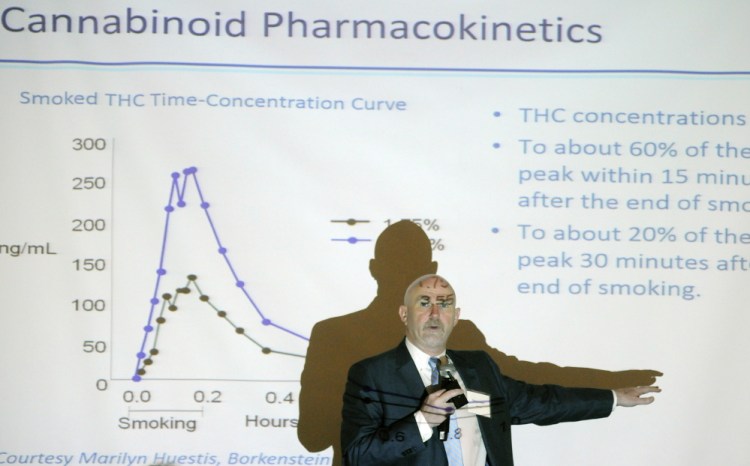AUGUSTA — An effort before the Legislature to set a blood limit standard for marijuana-impaired drivers was criticized by pot advocates on Thursday who said science doesn’t support it.
Marijuana-impaired driving was a main focus of this year’s Maine Impaired Driving Summit, run by the Maine Bureau of Highway Safety and AAA at the Augusta Civic Center. Medical marijuana is legal in Maine, and in 2016 voters could be asked to decide on dueling proposals to legalize recreational marijuana, which only Colorado, Washington and Alaska have done so far.
As is the case with alcohol, driving while under the influence of marijuana and other drugs is prohibited in Maine. But it’s rarer and cases can be hard to prove. With alcohol, there’s a legal limit that indicates intoxication. Maine has no standard for marijuana, and of the nation’s 23 medical marijuana states, it’s one of 12 where convictions must be proved through a totality of evidence, including blood tests, erratic driving and sobriety test results, according to the Marijuana Policy Project.
Now the Legislature is considering a bill that would set a blood intoxication level of 5 parts per billion of tetrahydrocannabinol, or THC, marijuana’s psychoactive ingredient. Six states have legal limits and Colorado, Washington and Montana have set them at the level that Maine is considering.
In Maine, there were 3,600 convictions for operating under the influence of alcohol in 2014 alone, but from 2004 to 2014, just 3,250 drivers were evaluated by the state’s drug recognition experts, according to data provided by Maine State Police Trooper Aaron Turcotte, a recognition expert. Of those, 1,400 had marijuana in their system.
The marijuana standard is an idea that first was put forward by the Maine Department of Public Safety, but it’s now part of a bill backed by Secretary of State Matthew Dunlap that would change driving laws. Marijuana advocates have been wary of the change, which has been supported by law enforcement. It’s now before the Legislature’s Transportation Committee.
“We know that legalization is coming to many states around the nation, and I think that states need to be prepared for it,” said Lauren Stewart, director of the Maine Bureau of Highway Safety.
But Barry Logan, chief of forensic toxicology for NMS Labs, a Pennsylvania-based company that provides testing for law enforcement and other clients, cautioned summit attendees that science isn’t conclusive on a level in marijuana that indicates impairment, even though it’s clear that marijuana slows motor functions and it’s the drug that shows up most after alcohol in blood tests of arrested, injured and dead drivers.
The federal National Highway Traffic Safety Administration released studies this year saying the number of drivers with marijuana in their systems increased 50 percent between 2007 and 2014 and that marijuana users are more likely to be in crashes, although that could be because young men, a main marijuana-using demographic, are already at increased risk of crashes.
Logan said while tests of 7,500 operating-under-the-influence cases from 2009 to 2014 at his laboratory confirmed the presence of marijuana, only 30 percent of subjects would have exceeded the 5 nanogram limit, which he said could cause police to miss cases in which drivers are impaired and cause people to believe that lower amounts are safe. He said states are “setting these numbers somewhat arbitrarily.”
At the summit, Jake Nelson, director of traffic safety advocacy for AAA, said he appreciates the effort to set a marijuana standard in Maine and elsewhere, but “we shoot ourselves in the foot if we introduce a tool that really has no research evidence basis.” He said strengthening Maine’s evidence-based system and drug recognition program would be a better approach.
“I think that public policy is way ahead of data and research on the issue of drugged driving, particularly when it comes to cannabis,” Nelson said.
Michael Shepherd — 370-7652
Twitter: @mikeshepherdme
Send questions/comments to the editors.



Success. Please wait for the page to reload. If the page does not reload within 5 seconds, please refresh the page.
Enter your email and password to access comments.
Hi, to comment on stories you must . This profile is in addition to your subscription and website login.
Already have a commenting profile? .
Invalid username/password.
Please check your email to confirm and complete your registration.
Only subscribers are eligible to post comments. Please subscribe or login first for digital access. Here’s why.
Use the form below to reset your password. When you've submitted your account email, we will send an email with a reset code.